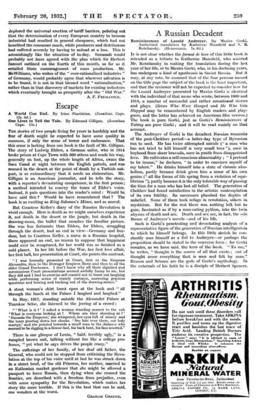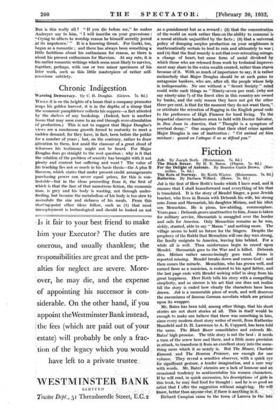A Russian Decadent
Reminiscences of Leonid Andreyev. By Maxim Gorki. . Authorized translation by Katherine Mansfield and S. Idd Koteliansky. (Heinemann. 7s. 6c1.) IT is not clear whether the format de luxe of this little book is intended as a tribute to Katherine Mansfield, who assisted Mr. Koteliansky in making the translation during the last year of her life, or to Maxim Gorki, who, in his declining years, has undergone a. kind of apotheosis in Soviet Russia. But it may, at any rate, be assumed that of the four persons named on the title page the subject of the book is the least itnportant, and that the reviewer will not be expected to consider how far the Leonid Andreyev presented by Maxim Gorki is identical with the individual of that name who wrote, between 1900 and 1914, a number of successful and rather sensational stories and plays. (Seven Who, Were Hanged and lie Who Gets Slapped may be remembered by English readers and play- goers, and the latter has achieved an American film version.) The book is pure Gorki, just as GorkCs Reminiscences of Tolstoy are pure Gorki ; and it will be read mainly on that account.
The Andreyev of Gorki is the decadent Russian romantic of the post-Chekhov period—a latter-day type of Byronism run to seed. He has twice attempted suicide (" a man who has not tried to kill himself is very small beer "), once in boyhood from sheer bravado, once in youth from disappointed love. He cultivates a self-conscious abnormality ; " I pretend to be insane," he declares, " in order to convince myself of my talent." He drinks himself into a state of chronic alco- holism, partly because drink gives him a sense of his own genius (" all the forces of life spring from a violation of equi- librium "), partly because it is the only tolerable way of passing the time for a man who has lost all belief. The generation of Chekhov had found satisfaction in the artistic contemplation of its own futility. Its successors plumbed the depths of unbelief. Some of them took refuge in revolution, others in mysticism. But for the rest there was nothing left but to gaze, fascinated as if by a man-eating python, into the twin abysses of death and sex. Death and sex are, in fact, the sole theme of Andreyev's novels—and of his life.
Such is Gorki's penetrating and devastating analysis of a representative figure of the generation of Russian intelligentsia to which he himself belongs. In this little sketch he con- stantly uses himself as a foil to Andreyev—or perhaps the proposition should be stated in the converse form ; for Gorki remains, as we have said, the hero of the book. " To me," he writes, " thought is the source of all that exists ; out of thought arose everything that is seen and felt by man." Reason and Science are the gods of Gorki's mythology. In the externals of his faith he is a disciple of Herbert Spencer.
But is this really all " If you die :before me," he makes Andreyev say to bin', " I will inscribe on your gravestone Crying to others to worship reason he himself secretly jeered at its impotence.' " It is a knowing thrust. For Gorki, too, began as a romantic ; and there has always been something a little factitious about his enthusiasm for reason, as there is about his present enthusiasm for Marxism. At any rate, it is this earlier romantic writings which seem most likely to survive, together, perhaps, with one or two minor specimens of his later work, such as this little masterpiece of rather self- :Conscious subtlety.







































 Previous page
Previous page